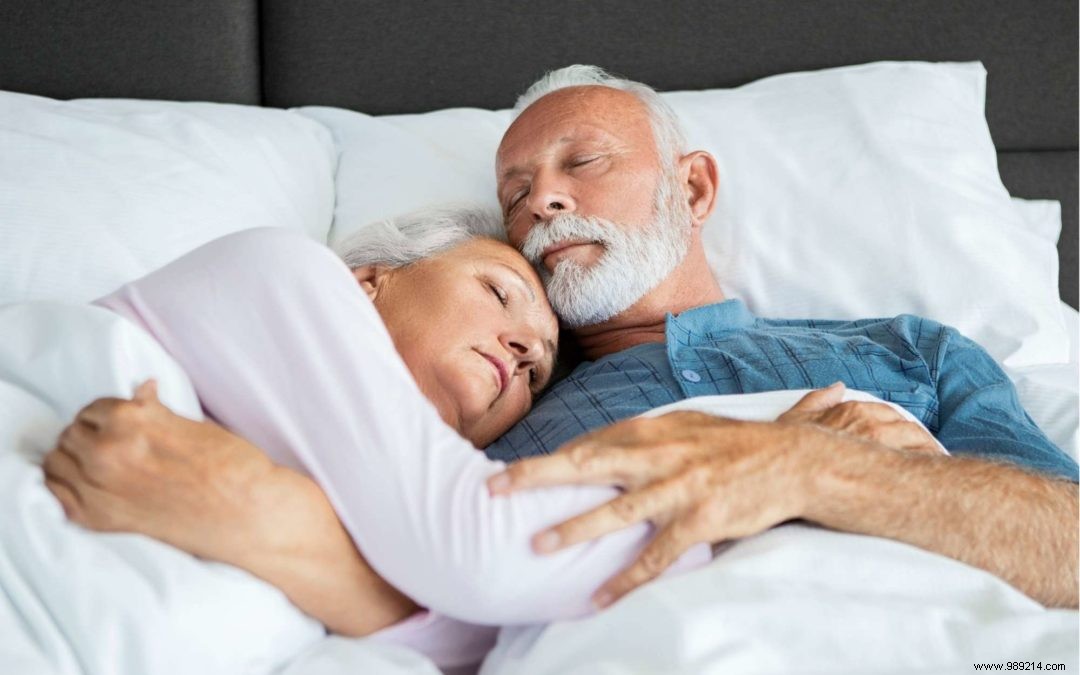
Sleep evolves naturally throughout life. But it can also be undermined by age-related health problems. Sleeping well most often requires good sleep hygiene. What are the actions to take or avoid to sleep better when you are over 60?
According to a survey by the National Institute of Sleep and Vigilance (INSV), 22% of seniors complain about their sleep. The most common difficulty? Nocturnal awakenings. At this period of life, these are indeed more frequent and prolonged, sometimes to the point of becoming disabling. Those over 80 wake up, for example, twice a night for an average of 31 minutes.
Sleep evolves naturally throughout life. With age, it tends to fragment, favoring nocturnal awakenings with their corollary, the desire to sleep during the day.
These awakenings during the night are all the more frequent and severe when there are associated physical or psychological disorders. Pain related to osteoarthritis or the urge to urinate during the night are often the cause of nocturnal awakenings.
Alongside this physiological evolution of sleep, certain pathologies more frequent in seniors can also disturb sleep:Alzheimer's disease, Parkinson's disease, sleep apnea...
Sleep disorders, however, are not a fatality after a certain age. Do not hesitate to seek advice from a specialist if you experience such difficulties.
Tired after a meal? Many seniors are reviving the tradition of the siesta. A good idea, provided you follow certain rules.
Seniors like to take a nap! Fifty percent of French people over 80 have returned to this tradition. In question:the fragmentation of sleep linked to age but also a more favorable schedule. At retirement time, it becomes easier to give in to the temptation of a siesta.
The 50-60 year olds opt for relatively short naps, on average 3 times a week. People over 80, on the other hand, take naps an average of 6 times a week. And this, for a little over an hour.
Take a nap ? Why not, provided you follow two rules:
A good night is preparing all day. Here are some tips to promote optimal sleep quality:
The French are big consumers of sleeping pills. Seniors are no exception! However, these treatments are not without risk.
According to the Haute Autorité de Santé (HAS), nearly one in three people over the age of 65 and nearly 40% of those over 85 regularly take sleeping pills. However, these treatments are not always used wisely.
Regular consumption of sleeping pills, and in particular benzodiazepines, is not without risk. These drugs can be very addictive and their effectiveness decreases over time.
In addition, their sedative effect increases the risk of falling – and therefore of fracture – if the person gets up at night, to go to the toilet for example.
According to one study, the use of benzodiazepines also increases the risk of long-term dementia, including Alzheimer's disease, by 50%.
Despite their drawbacks, sleeping pills can in some cases be useful. However, they should only be used for short periods, up to 4 weeks, and only if prescribed by your doctor. In other words, avoid the loan by a neighbor or relative.
Depression is common among seniors. It would affect 10 to 15% of people over 65 and up to 40% of people living in nursing homes. Social isolation, health problems, loss of a loved one... Different elements can contribute to making this period of life sometimes more difficult.
These high rates of depression are not without consequence. Mood and sleep are indeed intimately linked. Various processes related to mood regulation take place, for example, during the night.
But depression can also have an impact on the quality of sleep. 85% of depressed people also suffer from insomnia, and more particularly from untimely and repeated awakenings during the second part of the night.
To treat insomnia, it is most often necessary to fight the evil at the root. When sleep disorders are due to depression, psychotherapeutic treatment and/or the aid of antidepressants can significantly improve the quality of sleep. Since insomnia is often multifactorial, multidisciplinary management is generally recommended.
References
Sources
Writing
The content of this folder has been compiled by Vivio.
Interview with Dr. Marie-Françoise Vecchierini, doctor at the sleep center of the Hôtel Dieu Hospital (Public Assistance – Paris Hospitals) and former President of the French Society for Sleep Research and Medicine.